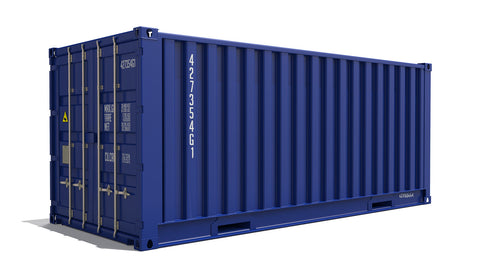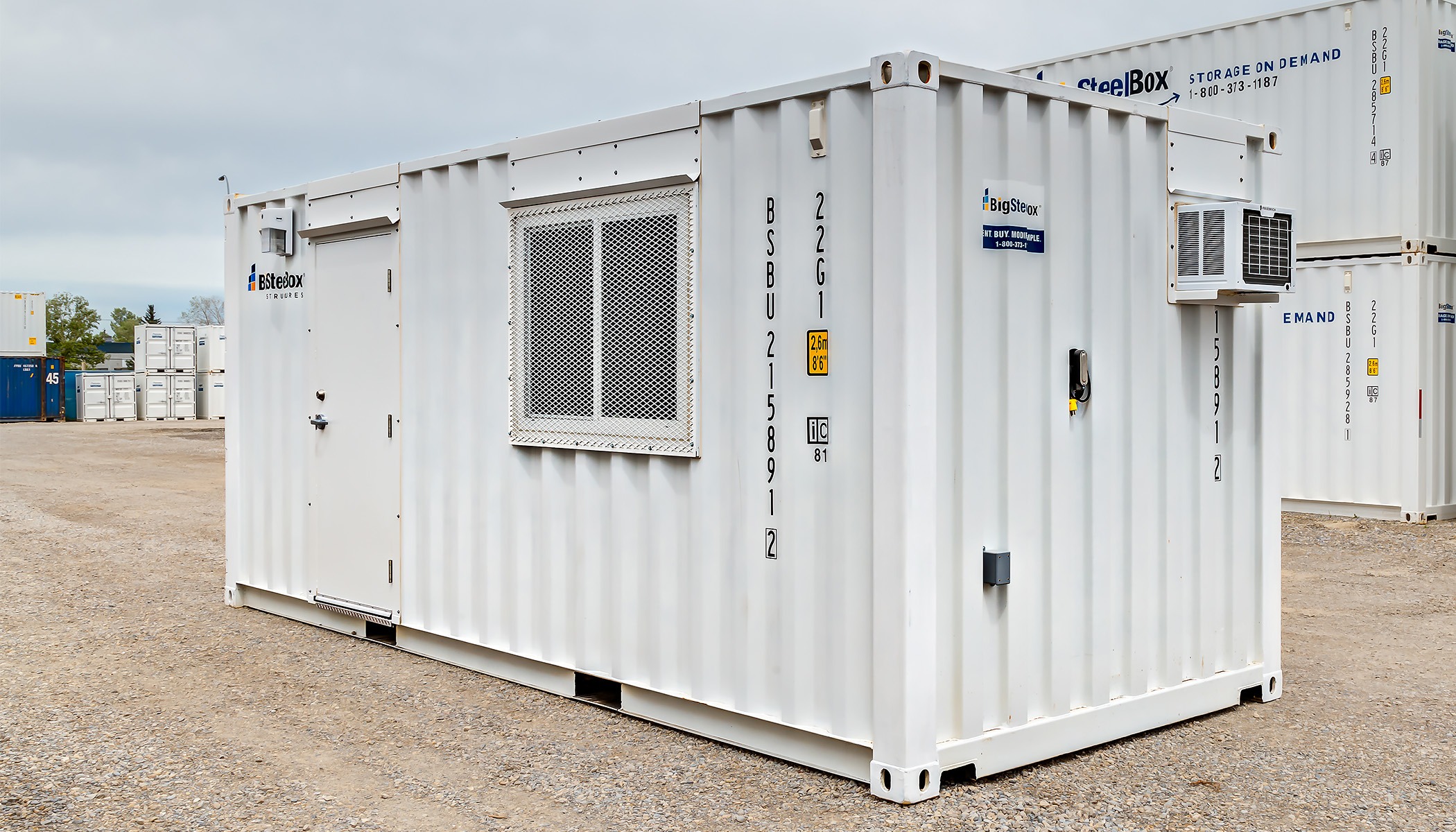The history of Shipping Containers for Sale and their role in commerce
Everything You Required to Learn About Shipping Containers and Their Practical Applications
Shipping containers have actually developed from simple tools for transportation to versatile structures with countless sensible applications. Their robust design and common sizing make them ideal for a series of uses beyond shipping. From innovative housing options to sustainable farming, their versatility is notable. Yet, the opportunities do not end there. Exploring their different functions discloses unusual insights right into modern challenges and imaginative services. What various other functions could these containers play in today's globe?
The Design and Framework of Shipping Containers

Internally, containers are developed to make best use of room, frequently featuring wooden or steel flooring that can support substantial weight. Air flow systems might be included to protect against wetness accumulation, which is critical for delicate freight. In addition, strengthened edges allow for easy handling by cranes and forklifts, assisting in seamless loading and unloading. This thoughtful layout and structure add to the containers' adaptability across various delivery and storage space applications.
Advantages of Making Use Of Shipping Containers
While numerous transport approaches have their advantages, the use of shipping containers stands apart because of their unmatched convenience and performance. Shipping containers use a standard dimension, making them simple to pile and transport throughout different modes of transport, including trains, vehicles, and ships. This standardization minimizes filling and unloading times, thus raising total productivity.
Shipping containers are constructed from resilient products, giving robust security for items during transit. They are weather-resistant and secure, minimizing the danger of damages from ecological factors or burglary. Furthermore, the modular style of shipping containers permits very easy personalization, making it possible for services to adapt them for different objectives, such as storage or mobile workplaces.
Lastly, their transportability and cost-effectiveness make delivery containers an attractive choice for services looking to simplify logistics and supply chain procedures. These benefits contribute to the growing appeal of shipping containers in various industries.
Creative Housing Solutions With Shipping Containers
Ingenious real estate options have actually become an amazing application of shipping containers, leveraging their fundamental staminas for domestic usage. These versatile frameworks offer a sustainable choice to conventional structure products, usually at a portion of the cost. Architects and designers have actually changed containers into stylish, useful homes, dealing with varied way of lives and preferences.
In addition, delivering containers are eco-friendly, advertising recycling and lowering waste. Many projects focus on energy effectiveness, incorporating solar panels and environment-friendly roof coverings. As urbanization rises, these ingenious housing services offer a practical action to housing scarcities while cultivating an unique architectural aesthetic.
Shipping Containers in Retail and Pop-Up Shops
An expanding number of retailers are turning to shipping containers as a vibrant service for retail spaces and pop-up shops. These versatile structures use a cost-effective alternative to traditional store fronts, enabling services to create unique, distinctive environments that attract customers. Their modular design enables easy transportation and installation, making them excellent for seasonal or short-term retail places.
Retailers can personalize delivery containers to reflect their brand identity, transforming them right into aesthetically appealing stores that stand out in crowded markets. The compact nature of containers likewise encourages reliable use of room, permitting innovative formats that maximize client circulation and engagement. Shipping containers can be located in unconventional locations, such as urban parks or uninhabited lots, boosting access and foot traffic.

As the retail landscape advances, delivering containers supply a ingenious and flexible service that satisfies the needs of modern consumers while enhancing the buying experience.
Sustainable Farming Practices Using Shipping Containers
Sustainable farming methods significantly integrate shipping containers as innovative solutions for farming - Shipping Containers. These container farms make use of hydroponics to optimize room and resource performance, offering an affordable method to food production. By transforming shipping containers into farming centers, my review here farmers can address food protection and environmental issues concurrently
Container Farming Advantages
While typical agriculture encounters obstacles such as land scarcity and environment change, container farming provides a feasible option that makes the most of space and sources. This cutting-edge approach enables year-round plant manufacturing in controlled atmospheres, decreasing reliance on climate condition. Container farms make use of less water than conventional farming, promoting sustainability and preservation. They can be established in city areas, bringing fresh fruit and vegetables closer to customers and decreasing transport discharges. Additionally, the modular nature of delivery containers allows scalability, allowing farmers to adjust operations based upon demand. Container farming likewise lessens pesticide use by producing an enclosed ecological community, inevitably boosting food safety and security. As city populaces grow, container farming emerges as a sensible solution to fulfill the enhancing need for local, lasting food resources.
Hydroponics in Containers
Hydroponics, which enables plants to expand without soil by using nutrient-rich water, grows within the confines of delivery containers, making it an excellent technique for urban farming. These containers develop a controlled environment that maximizes moisture, temperature level, and light, allowing year-round farming. With minimal space in metropolitan locations, shipping containers provide a scalable solution for growing fresh produce. Hydroponic systems within containers can include different methods, such as nutrient movie technique (NFT) and deep water society (DWC), which take full advantage of yield while decreasing water use. This innovative method not only boosts food protection however additionally minimizes the carbon impact connected with traditional farming approaches. Hydroponics in containers stands for a forward-thinking remedy for lasting metropolitan food manufacturing.
Economical Agriculture Solutions
As food manufacturing encounters boosting obstacles as a result of climate modification and urbanization, shipping containers arise as a cost-efficient service for farming. These functional structures can be repurposed for various lasting farming methods, such as hydroponics and vertical farming. By utilizing controlled environments within containers, farmers can optimize development cycles and reduce source intake, consisting of water and plant foods. Furthermore, shipping containers can be strategically placed in city areas, decreasing transport prices and boosting accessibility to fresh produce. Their modular nature enables scalability, enabling farmers to expand procedures as demand grows. Repurposing containers adds to squander decrease, lining up with environmentally friendly agricultural initiatives. In general, delivering containers present cutting-edge opportunities for sustainable and effective food production.
Emergency and Calamity Alleviation Applications of Shipping Containers

Organizations regularly make use of shipping containers to develop mobile clinics or field healthcare facilities, ensuring that treatment reaches those in demand. In addition, they can be transformed into command centers for working with rescue operations, consequently improving organizational performance during dilemmas.
Containers can be customized to keep vital items such as food, apparel, and water, securing products up until they are dispersed. Their movement enables them to be conveniently delivered to numerous locations, ensuring that assistance shows up where it is most urgently required. Overall, delivery containers play an essential function in improving the efficiency of calamity alleviation efforts worldwide.
Regularly Asked Inquiries
Exactly How Are Shipping Containers Transported From One Area to Another?
Shipping containers are carried by means of trucks, trains, and ships, using cranes for filling and dumping. This multi-modal transportation system makes sure reliable movement throughout land and sea, connecting worldwide supply chains and assisting in international trade.
What Is the Typical Life Expectancy of a Delivery Container?
The ordinary life-span of a shipping container commonly varies from 10 to 25 years, depending on maintenance, usage, and environmental aspects. Proper treatment can prolong their functionality, while forget may bring about damage and damages.
Can Shipping Containers Be Customized for Various Usages?
Yes, delivering containers can be customized for numerous uses. They act as homes, workplaces, pop-up stores, and storage space systems. Their versatility permits for creative adjustments, making them ideal for a variety of applications.
Are Shipping Containers Eco Friendly?
Shipping containers can be ecologically friendly, as they promote recycling and repurposing. Their durability reduces waste, while their usage in alternate real estate and services reduces the need for new materials, adding to lasting techniques.
How Do I Select the Right Dimension Shipping Container?
To choose the best size delivery container, one need to evaluate storage space requirements, consider the intended use, and examine area accessibility - Shipping Containers for Sale. Common sizes consist of 40-foot and discover this info here 20-foot containers, each serving numerous storage and transport requirements effectively
Cutting-edge housing services have arised as an interesting application of delivery containers, leveraging their wikipedia reference inherent staminas for residential usage. The adaptability of delivery containers allows for creative formats, from single-unit homes to complex multi-container arrangements. Lasting farming practices progressively include delivery containers as ingenious options for agriculture. Additionally, the modular nature of delivery containers allows scalability, permitting farmers to change operations based on demand. Hydroponics, which allows plants to grow without dirt by making use of nutrient-rich water, grows within the boundaries of shipping containers, making it an excellent technique for metropolitan agriculture.